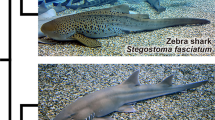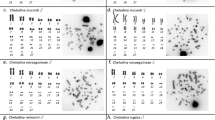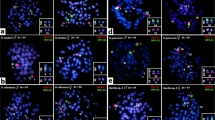Abstract
THIS investigation was undertaken to compare the chromosomes of two species of porpoise, the Atlantic bottlenose (Tursiops truncatus) and the Pacific white-striped porpoise (Lagenorynches obliquidens), both small odontacete cetaceans of the family Delphinidae. The chromosome number and karyotypes were established for a male and female T. truncatus and for two males and one female L. obliquidens.
This is a preview of subscription content, access via your institution
Access options
Subscribe to this journal
Receive 51 print issues and online access
$199.00 per year
only $3.90 per issue
Buy this article
- Purchase on Springer Link
- Instant access to full article PDF
Prices may be subject to local taxes which are calculated during checkout
Similar content being viewed by others
References
Lane, J. N., Bull. Florida State Museum, 9, 155 (1965).
Arakaki, D. T., and Sparkes, R. S., Cytogenetics, 2, 57 (1963).
Makino, S., Chromosoma, 3, 220 (1947–50).
Walen, K. H., and Madin, S. H., Amer. Naturalist, 99, 349 (1965).
Author information
Authors and Affiliations
Rights and permissions
About this article
Cite this article
DUFFIELD, D., RIDGWAY, S. & SPARKES, R. Cytogenetic Studies of Two Species of Porpoise. Nature 213, 189–190 (1967). https://doi.org/10.1038/213189a0
Issue Date:
DOI: https://doi.org/10.1038/213189a0
Comments
By submitting a comment you agree to abide by our Terms and Community Guidelines. If you find something abusive or that does not comply with our terms or guidelines please flag it as inappropriate.



